Latest Circular economy reports

Research 479: A Review of Circular Economy and Bioeconomy Governance in Ireland
Authors: Joanna O’Riordan, Richard Boyle, Seán Keating and Fergal O’Leary, March 2025
Year: 2025
The circular economy and bioeconomy are critical elements of tackling climate change and other global challenges like waste, and pollution, biodiversity loss and water stress, with the aim of using finite resources more sustainably. This research details the complexities and challenges of governance and policy implementation for the circular economy and bioeconomy in Ireland and highlights the need for robust structures, clear roles, leadership, and stakeholder engagement. It concludes that there is an opportunity in the forthcoming Whole-of-Government Circular Economy Strategy and Bioeconomy Strategy to promote meaningful policy coherence and greater collaboration to leverage impactful actions learning and synergies in the implementation of both policy areas.

Research 478: Critical Raw Materials for Ireland for a Resource-Efficient Circular Economy (CIRCLE)
Authors: Ahmar Murtaza, Maham Mahnoor, Anum Inam, Ali Akbar Shah, Muhannad Ahmed Obeidi and Inam Ul Ahad, February 2025
Year: 2025
Global raw material supply is becoming increasingly complex and uncertain, exacerbated by resource scarcity and supply chain vulnerabilities. Critical raw materials (CRM) are vital for industrial growth and competitiveness and a resilient circular economy. Ireland lacked a raw material criticality assessment methodology tailored to its unique economic and resource landscape. To address this gap, the CIRCLE research project developed a CRM methodology tailored to Ireland’s economic and resource landscape. Three methods were developed for assessing raw material criticality with a total of 42 raw materials assessed. The research finding assist stakeholders, including industry and policymakers, in identifying essential materials for various industrial sectors, providing insights into potential supply risks and economic impacts. The report recommends the establishment of a national database to include CRM, Circular material use rate (CMUR) and material flow analysis data.

Research 470: FoodPath – Investigating Behavioural Interventions to Reduce Food Waste in Irish Households
Authors: Colum Gibson, Eileen Mitchell, Keelin Tobin, Alberto Longo, Sarah O’Connor and Elizabeth Gold, December 2024
Year: 2024
Food waste is a global issue with significant economic, social and environmental impacts, it is responsible for 8–10% of global greenhouse gas emissions. Ireland aims to reduce food waste by 50% by 2030 through initiatives like the Climate Action Plan, Waste Action Plan for a Circular Economy, and National Food Waste Prevention Roadmap. With food waste influenced by several socio-economic factors, behaviours and attitudes, EPA estimate that in Ireland 29% is generated by households. Building on the EPA's Stop Food Waste programme, the FoodPath project implemented two interventions: Intervention A using tools, nudges, and messaging via waste collectors proved a cost-efficient household food waste reduction model. Intervention B, targeting social norms via community groups, was less impactful but showed potential to amplify the effects of Intervention A. The research provides recommendations for behaviour change strategies and pathways for large-scale reductions in household food waste.

Research 467: Raising Awareness of and Educating Consumers about Reusable Sanitary Products: Developing Strategies for the Promotion of Reusable Nappies, Wipes and Menstrual Items
Author: Abigail O’Callaghan-Platt, November 2024
Year: 2024
Widespread use of disposable single-use sanitary items, nappies and disposable wipes are causing harm to the land and marine environments. Many sanitary items can contain significant levels of plastic (e.g. up to 90% plastic in some menstrual items) and can form a large proportion of household waste (e.g. in 2022 nappies accounted for 10%). With the Single Use Plastics Directive and Waste Action Plan for a Circular Economy aiming to reduce single use plastics, and extend producer responsibility requirements, this research focuses on the use of more sustainable options for nappies, wipes and menstrual items. The research combined educational workshops and the provision of reusable alternatives through both the ‘Cloth Nappy Incentive Scheme’ and the ‘No Plastic. Period. Programme'. With a high level of public participation the research identifies four further research and four policy recommendations to enable increased national uptake of reusable nappies, baby wipes and menstrual items.

Research 466: Forecasting WEEE Arising for Electric Vehicle Batteries and Photovoltaic Panels in Ireland
Authors: Michael Johnson, Narjes Fallah, Sheila Killian and Colin Fitzpatrick, October 2024
Year: 2024
Globally, energy systems are undergoing two simultaneous and radical transformations that present a new set of challenges in sustainable waste management: the electrification of the transportation network and the decarbonisation of the electricity grid. This research examines challenges and models scenarios for the sustainable management of LongWEEE. Electrical devices with a longer than average lifetime are classed as LongWEEE with this study focusing on solar photovoltaic (PV) panels and electric vehicle batteries (EVBs). Modelled results for both sectors out to 2050 show a lot of uncertainty regarding the quantities of LongWEEE that will be generated in the future, but that in dealing with inevitable increases WEEE management systems need to to be prepared to cover a range of eventualities. Both “pay when placed” and “pay when collected” financing approaches to collection and treatment were examined in the study with the “pay when placed” identified as the most prudent approach.

Research 463: Identifying the Source and Scale of Plastic in Compost Derived from Household and Commercial Food Waste
Authors: Percy Foster, Tony Breton and Eoin Bird, October 2024
Year: 2024
The presence of contaminants in food waste bins requires further processing of the material, it incurs higher costs to remove the contaminants and results in lower value compost and digestate. This research indicates that the amount of plastic contamination in biowaste collections is increasing and that there is a need to significantly reduce the input of contaminants, particularly plastics, into the soil from the application of compost and digestate derived from food waste. Using 50 waste characterisation studies the research provides new information and insights on the trends in types of plastic contamination. With extensive stakeholder engagement and a comprehensive review of policy legislation, the research also provides policy actors and relevant stakeholders with information and recommendations on how to address issues associated with plastic contamination in compost.

Research 462: Sustainable and Holistic management of Irish Ports (SHIP)
Authors: Wesley Flannery, Christina Kelly and Brendan Murtagh, October 2024
Year: 2024
Ireland’s ports and harbours are of strategic importance and are essential for its local, regional, and national economies. Ports are vital hubs that connect manufacturers, traders and consumers within global supply chains. Ports also play an important role in sustainable transport, as shipping is the most energy-efficient way to move freight and goods over longer distances. Nonetheless, ports can also be responsible for adverse environmental, health and social impacts such as air, water and noise pollution; traffic congestion; and damage to terrestrial and marine ecosystems. The (SHIP) project investigated methods to overcome challenges identified across the complex nature of ports and the diverse range of port activities and stakeholders to facilitate Ireland’s transition towards more sustainable port practices. It delivers a policy framework with recommendations on port governance, innovation, decarbonisation, port connectivity, efficiency and investment.

Research 458: A Critical Analysis of Ireland’s Circular Material Use Rate (CAIR)
Authors: Jack McCarthy, Colman McCarthy, Carlos Pablo Sigüenza, Gergo Suto, Colum Gibson, Claire Downey and Adam Boland , July 2024
Year: 2024
Ireland has registered a relatively poor score in terms of the Circular Material Use Rate (CMUR) – a key circular economy metric of the European Union. Ireland’s policy ambitions are to surpass the EU average in this metric by 2030. The aims of the CAIR (a Critical Analysis of Ireland’s circular material use Rate) project were to firstly identify factors driving Ireland’s relatively low CMUR performance and secondly to identify actions through which Ireland’s CMUR score could be improved. The research activities included an interrogation of how the CMUR metrics function, analysis of the data used, a comparison of the data and statistical profile of Ireland with three other Member States, and the development of proposals for improving Irelands CMUR score.
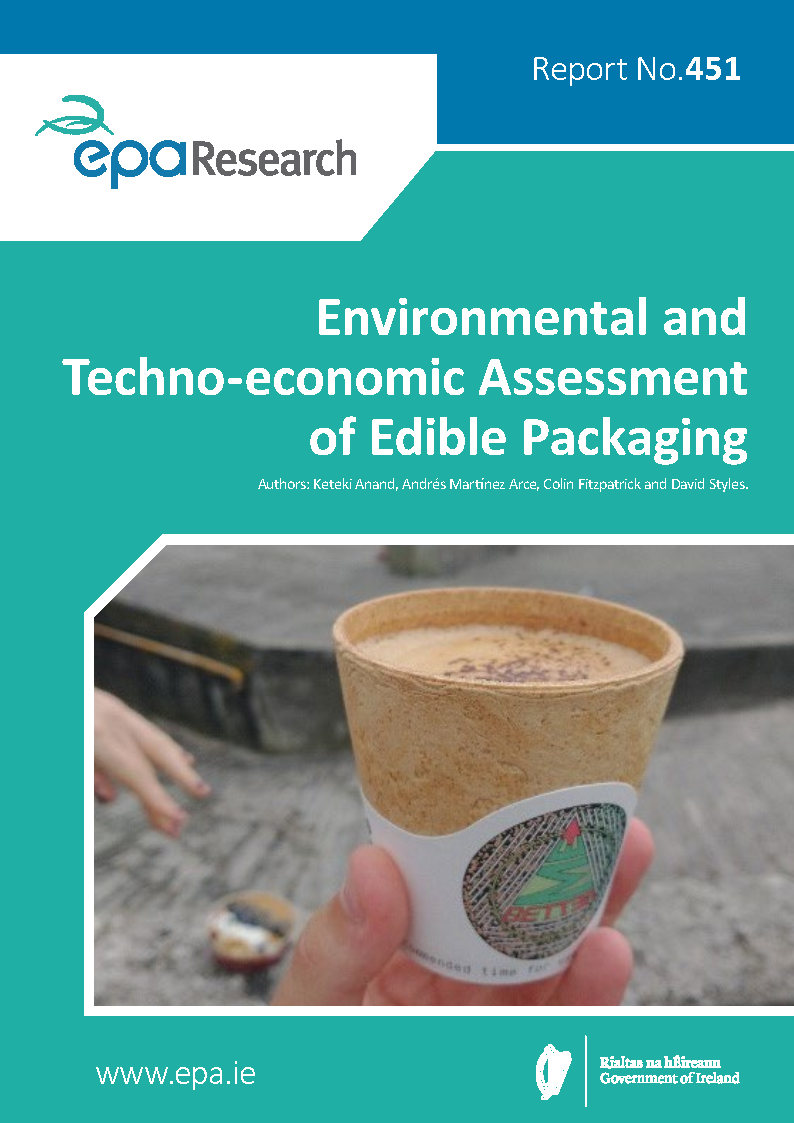
Research 451: Environmental and Techno-economic Assessment of Edible Packaging
Authors: Keteki Anand, Andrés Martínez Arce, Colin Fitzpatrick and David Styles, March 2024
Year: 2024
It is estimated that 550,000 cups per day are used in the Irish market alone, and that this could increase to an annual total of 300 million cups per year by 2025. Although there is a common perception among consumers that paper cups are recyclable, and thus a sustainable option, this is not necessarily true. These cups are lined with plastic, which is difficult to separate from the paper, and most paper cups are sent to residual waste streams for landfill or incineration. The concept of edible packaging has the potential to help address littering and waste management challenges from single-use disposable cups. EAT-Packaging undertook a life cycle assessment across a range of relevant cup types and engaged with national stakeholders to develop scenarios to identify where, when, and how edible cups (or alternative options) could reduce environmental impact for the functional unit of a cup containing a single drink.

Research 435: Industrial Water 4.0 – A Framework for Catchment-based Digitally Integrated Industrial Water Stewardship
Authors: Colm Gaskin, Ken Stockil, Thomas Track, William Horan, Andres Lucht and Paul Conheady, July 2023
Year: 2023
Industrial activity is intrinsically linked to the accessibility and availability of water. The increasing global demand for industrial water poses a significant risk management challenge for organisations aiming to decouple the growth of production capacity from unsustainable consumption. This report presents a framework for industrial water users to adopt Industrial Water 4.0.
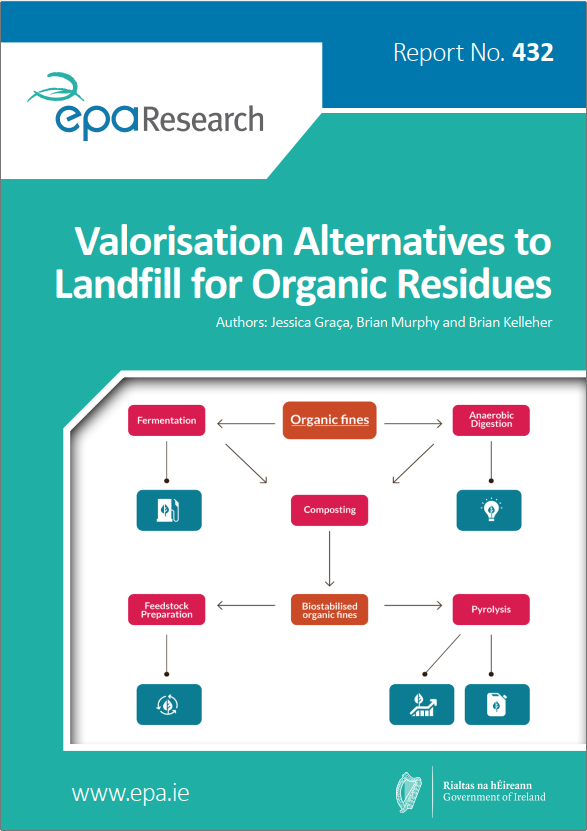
Research 432: Valorisation Alternatives to Landfill for Organic Residues
Authors: Jessica Graça, Brian Murphy and Brian Kelleher, May 2023
Year: 2023
The EPA’s latest data (November 2022) show that municipal waste generation increased by over 440,000 tonnes in the last 5 years, and now amounts to 3.2 million tonnes. The VALOR study looked at how the resource value of the mechanically separated organic fraction of municipal solid waste (MS-OFMSW) can be maximised. The study also characterised the organic fractions of municipal solid waste (MSW).
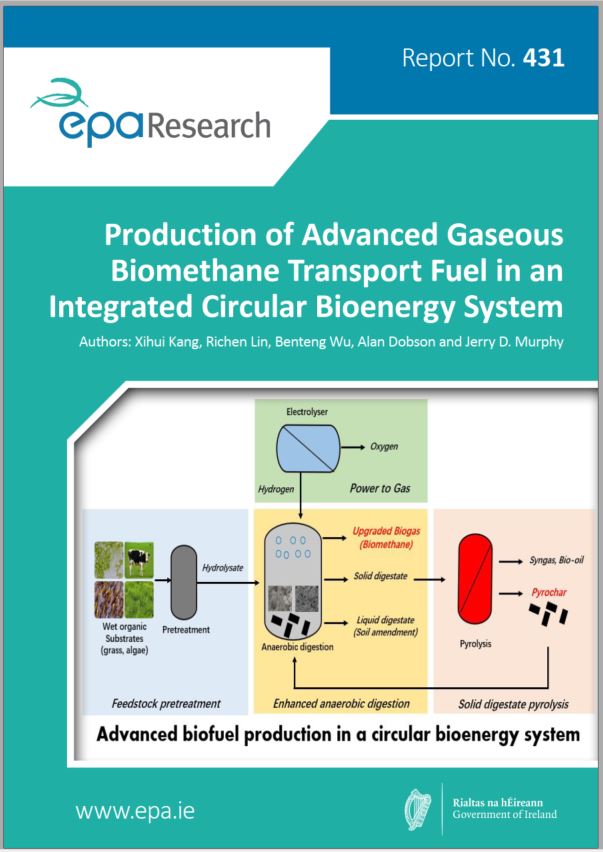
Research 431: Production of Advanced Gaseous Biomethane Transport Fuel in an Integrated Circular Bioenergy System
Authors: Xihui Kang, Richen Lin, Benteng Wu, Alan Dobson and Jerry D. Murphy, April 2023
Year: 2023
Transport is by far the largest source of energy-related CO2 emissions in Ireland. This highlights the need for a rapid transition from a linear fossil fuel-based economy to a bio-based economy that treats waste as a commodity, reduces GHG emissions, sequesters carbon and produces biofuels, biofertilisers, and bioproducts. The aim of the Advanced Gaseous Biomethane project was to develop an integrated system that produces biomethane using biomass to fuel the transport sector cleanly and support Ireland in achieving key emissions targets.
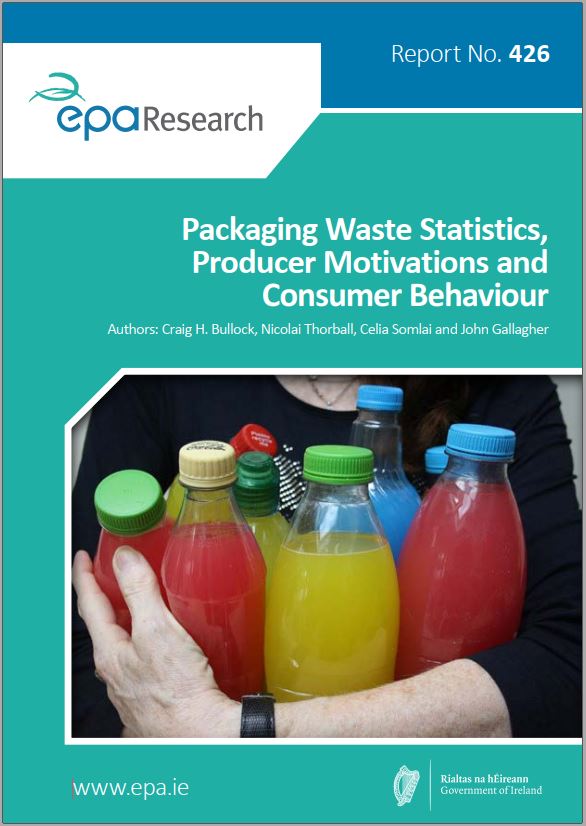
Research 426: Packaging Waste Statistics, Producer Motivations and Consumer Behaviour
Authors: Craig H. Bullock, Nicolai Thorball, Celia Somlai and John Gallagher, December 2022
Year: 2022
The production of plastic packaging for food and other products has increased substantially over the past 50 years. The ReWrapped project investigated why Ireland’s production of plastic packaging waste appears to be higher than that of other EU Member States. The project also undertook a survey of producers to help understand what drives their use of different types of plastic and the extent to which sustainability considerations influence their decision-making.
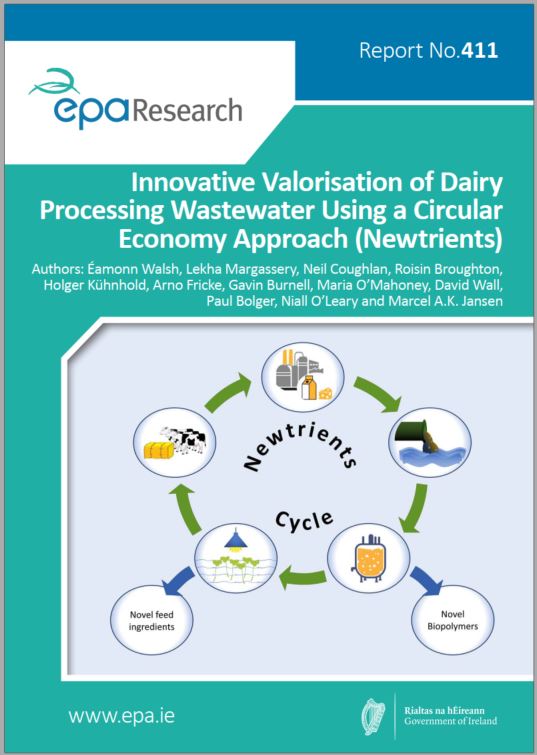
Research 411: Innovative Valorisation of Dairy Processing Wastewater Using a Circular Economy Approach (Newtrients)
Authors: Éamonn Walsh, Lekha Margassery, Neil Coughlan, Roisin Broughton, Holger Kühnhold, Arno Fricke, Gavin Burnell, Maria O’Mahoney, David Wall, Paul Bolger, Niall O’Leary and Marcel A.K. Jansen, June 2022
Year: 2022
There are pressing economic and environmental concerns regarding the imbalance between resource consumption and regeneration. This research successfully demonstrated a paradigm shift in how wastewater is treated by developing a pioneering cascading system for valorisation of dairy wastewater, based on circular economy principles. It successfully developed an integrated system coupling microbial-based technologies of anaerobic digestion and aerobic dynamic feeding with duckweed cultivation.
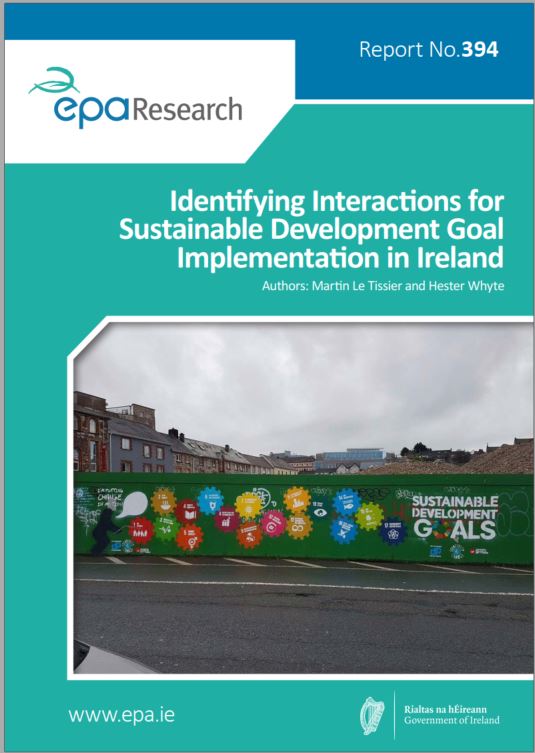
Research 394: Identifying Interactions for Sustainable Development Goal Implementation in Ireland
Authors: Martin Le Tissier and Hester Whyte, October 2021
Year: 2021
This report addresses how understanding of interlinkages between the Sustainable Development Goals (SDGs) of the United Nations Agenda 2030 and Ireland’s policy portfolio can advance understanding to meeting SDG targets and a “whole-of-government” approach to policy implementation.
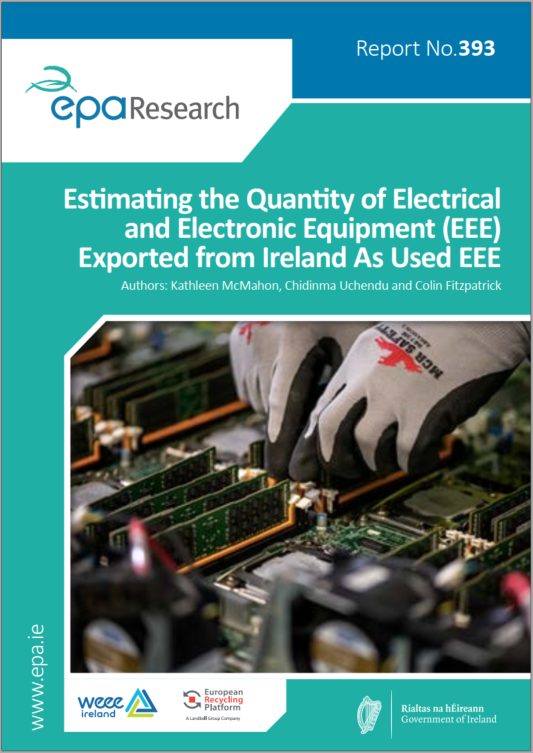
Research 393: Estimating the Quantity of Electrical and Electronic Equipment (EEE) Exported from Ireland As Used EEE
Authors: Kathleen McMahon, Chidinma Uchendu and Colin Fitzpatrick, October 2021
Year: 2021
Ireland has met or exceeded collection and recovery targets for waste electrical and electronic equipment (WEEE) in recent years. However, as targets have risen, Ireland’s stakeholders must identify and address challenges presented by WEEE that does not arise in collection. This research identifies two pathways by which UEEE is exported for the purpose of reuse, namely through the shipment of roll-on roll-off vehicles and through the shipment of professional IT equipment, and it aims to quantify the amount of UEEE exported through each pathway.
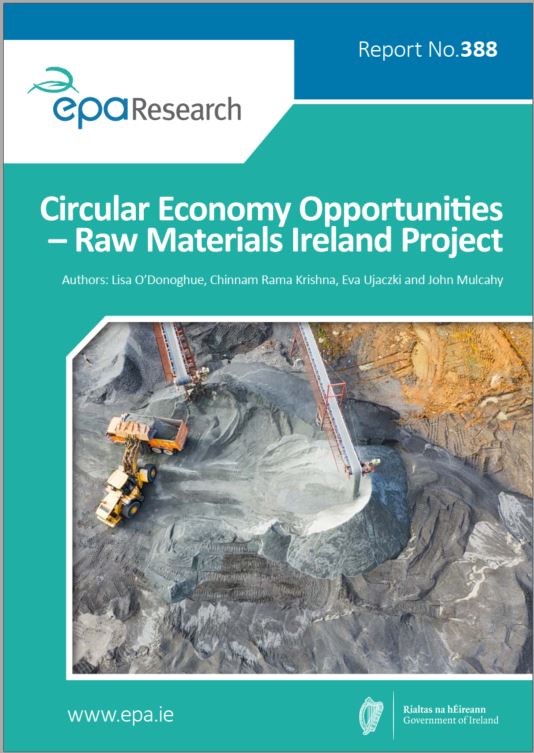
Research 388: Circular Economy Opportunities – Raw Materials Ireland Project
Authors: Lisa O’Donoghue, Chinnam Rama Krishna, Eva Ujaczki and John Mulcahy, August 2021
Year: 2021
Ireland is home to primary industries in mining, materials processing and power generation. Today, most waste outputs associated with these industries are either sent for disposal or exported. The research focused on techniques for mechanical and physical separation, to unlock valuable materials such as iron, aluminium, calcium and critical raw materials (gallium, indium and phosphorus).
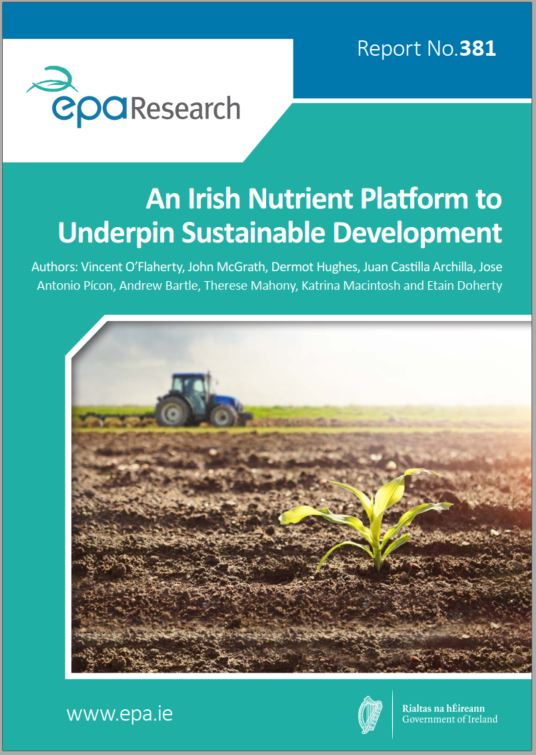
Research 381: An Irish Nutrient Platform to Underpin Sustainable Development
Authors: Vincent O’Flaherty, John McGrath, Dermot Hughes, Juan Castilla Archilla, Jose Antonio Pícon, Andrew Bartle, Therese Mahony, Katrina Macintosh and Etain Doherty, June 2021
Year: 2021
The UN Agenda for Sustainable Development consists of 17 Sustainable Development Goals (SDGs), underpinned by 169 targets, which aim to “end poverty, protect the planet and ensure prosperity for all”. These SDGs are expected to frame national policy agendas over the next 15 years in the context of both domestic and international policy, with an overarching desire to link environmental sustainability to sustainable economic development and the recognition that the management and protection of the environment are vital to economic wellbeing and a healthy society.